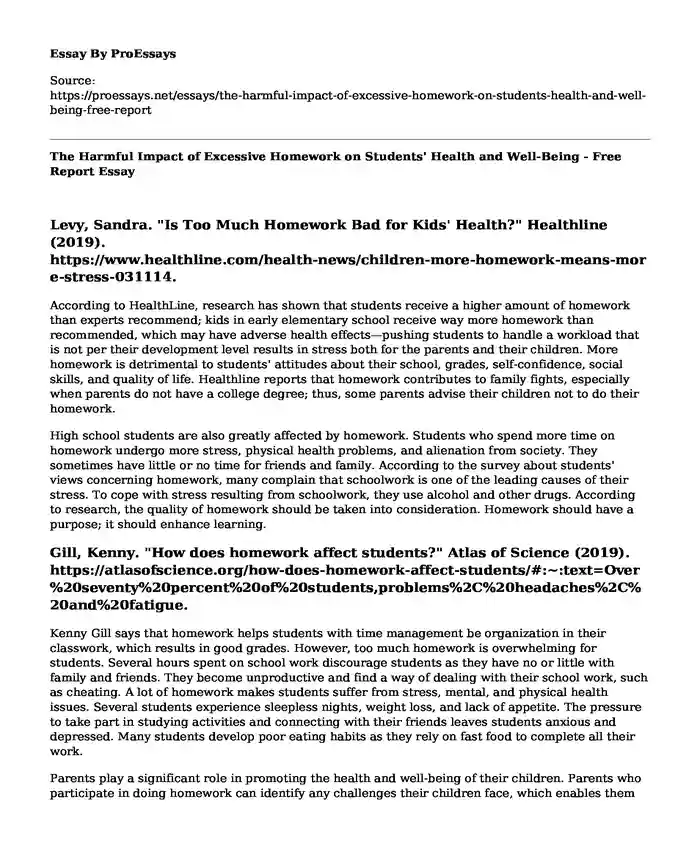Levy, Sandra. "Is Too Much Homework Bad for Kids' Health?" Healthline (2019). https://www.healthline.com/health-news/children-more-homework-means-more-stress-031114.
According to HealthLine, research has shown that students receive a higher amount of homework than experts recommend; kids in early elementary school receive way more homework than recommended, which may have adverse health effects—pushing students to handle a workload that is not per their development level results in stress both for the parents and their children. More homework is detrimental to students' attitudes about their school, grades, self-confidence, social skills, and quality of life. Healthline reports that homework contributes to family fights, especially when parents do not have a college degree; thus, some parents advise their children not to do their homework.
High school students are also greatly affected by homework. Students who spend more time on homework undergo more stress, physical health problems, and alienation from society. They sometimes have little or no time for friends and family. According to the survey about students' views concerning homework, many complain that schoolwork is one of the leading causes of their stress. To cope with stress resulting from schoolwork, they use alcohol and other drugs. According to research, the quality of homework should be taken into consideration. Homework should have a purpose; it should enhance learning.
Gill, Kenny. "How does homework affect students?" Atlas of Science (2019). https://atlasofscience.org/how-does-homework-affect-students/#:~:text=Over%20seventy%20percent%20of%20students,problems%2C%20headaches%2C%20and%20fatigue.
Kenny Gill says that homework helps students with time management be organization in their classwork, which results in good grades. However, too much homework is overwhelming for students. Several hours spent on school work discourage students as they have no or little with family and friends. They become unproductive and find a way of dealing with their school work, such as cheating. A lot of homework makes students suffer from stress, mental, and physical health issues. Several students experience sleepless nights, weight loss, and lack of appetite. The pressure to take part in studying activities and connecting with their friends leaves students anxious and depressed. Many students develop poor eating habits as they rely on fast food to complete all their work.
Parents play a significant role in promoting the health and well-being of their children. Parents who participate in doing homework can identify any challenges their children face, which enables them to provide support, such as helping them create a routine and designated area for studying and doing their homework. According to Kenny Gill, tackling homework with friends has benefits such as mind refreshing, sharpening communication skills, and sometimes making too much homework bearable.
Barletta, Sarah. "Homework may do more harm than good." Chicago Tribune (2012). https://www.chicagotribune.com/news/ct-xpm-2012-04-08-0204080035-story.htmlAccording to Sarah Barletta, homework is not beneficial to students at all. Students are forced to skip evenings with their families to work on schoolwork such as long essays or mathematics problems. Even though homework has been a tradition, the number of assignments given to students has significantly increased, causing students to spend long hours working on them. Teenagers who spend part of their time on part-time jobs are also not spared. More homework added to their busy lives has adverse effects such as stress. The desire to do well makes them abandon their other responsibilities, such as being a part of their family.
Some students are given mathematics problems that are beyond their capabilities, making them spend so much time to find solutions, sometimes consulting their parents and sometimes they see no point in trying and hence giving up; this leaves both the students and teachers to do more work at school the following day. Sarah Barletta concludes that homework does more harm than benefit both students and their parents. It causes family stress and reduces family-time, tension, and lack of sleep.
Summary
The above sources point out that homework does more damage than benefits. Long hours spent doing homework cause students to experience chronic stress, emotional exhaustion, sleep deprivation, weight loss, headaches, and physical and mental health issues. Students lack enough time to take part in co-curricular activities such as sports. Co-curricular activities have some benefits such as sharing with friends, refreshing their minds, and catching up. In coping with the pressure associated with school, students end up cheating all through, and others use alcohol, which adversely affects their health. To deal with family tensions associated with too much homework, some parents instruct their younger children not to do their homework.
Quality of homework is what should be taken seriously and not the quantity. Too much homework cuts into family time and causes anxiety and depression. Therefore, the amount of homework given to students should be reduced to give room for other activities such as sports, volunteering, etcetera.
Cite this page
The Harmful Impact of Excessive Homework on Students' Health and Well-Being - Free Report. (2024, Jan 28). Retrieved from https://proessays.net/essays/the-harmful-impact-of-excessive-homework-on-students-health-and-well-being-free-report
If you are the original author of this essay and no longer wish to have it published on the ProEssays website, please click below to request its removal:
- Nurse Educator Philosophy Statement Paper Example
- Health Factors and Practices in Disaster and Emergency Situations Paper Example
- Melanoma Skin Cancer - Essay Sample
- Importance of Healthy Eating Essay Example
- Depiction of a Quote from the Narrative "Gateman's Gift" by Narayan Essay Example
- Terry Fox's Contribution to the Research for Cancer Treatment Paper Example
- Elderly in Community: Support Groups for Safety, Health & Wellness - Essay Sample







